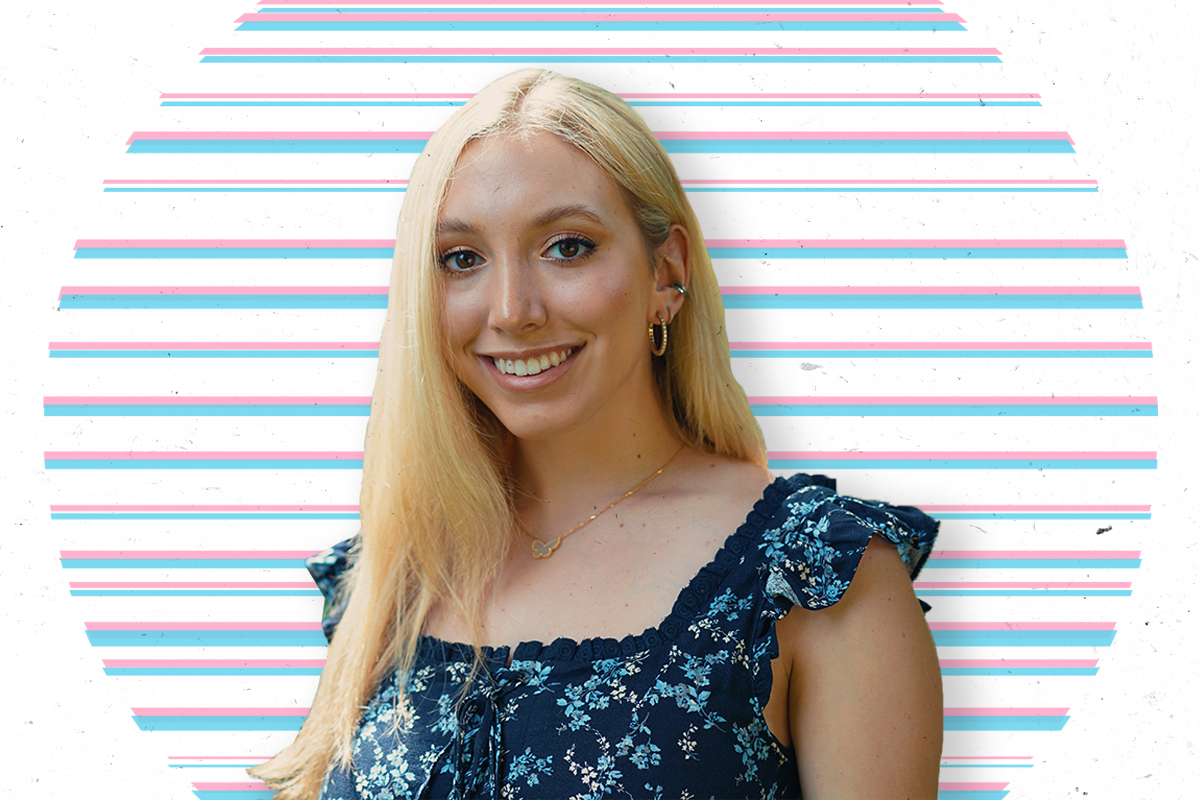Period poverty is not just a women’s issue, 18-year-old Sophie Draluck writes to me over e-mail. Period poverty is the lack of affordable access to menstrual products and education — a cause the Jewish teen is working to change.
“It’s important to reframe period poverty as a human issue,” Sophie explains. “Not all women menstruate and not all menstruators are women, but whether or not you personally menstruate or struggle to afford menstrual products, we should all care about this issue because our world cannot reach its potential when so many of her inhabitants are restricted by a natural process. We all have something to gain by women’s full participation in our communities: When girls win, we all win.”
Sophie, from Highland Park, Illinois, is one of the 2020 recipients of the Diller Teen Tikkun Olam Awards for her work starting Cycle Forward, a nonprofit that advocates for menstrual equity and empowers women and girls in need by providing free access to menstrual products through partnerships with food pantries, shelters, and other organizations across the Chicago area, Florida, the United Kingdom, India, and Haiti. We chatted over e-mail about eradicating period poverty, tikkun olam, and how she balances schoolwork and her drive for social justice.
Why is menstrual equity so important?
Menstrual equity is so important because when women lack access to proper menstrual products, they are effectively unable to fully participate in their schools, jobs, and communities, leaving them at distinct disadvantages academically, socially, and economically. When you look at these consequences, you realize that menstrual equity is truly about women’s empowerment, and we simply cannot empower women and girls around the globe without achieving menstrual equity. This battle is ultimately about attaining gender equality, something that in 2020 is too long overdue.
It’s also important to realize that the path to empowerment for most women is through education, and the sad truth is that the stigmatization of menstruation and the lack of access to menstrual products in certain parts of the world are serious roadblocks to girls getting the education they need, which is why achieving menstrual equity is so critical.
We need to realize that if we want to see women become truly equal to men, and for women to have a seat at global leadership tables, where our voices will be heard about issues that matter to us, we need to remove the roadblocks to education and other opportunities for advancement that are posed by period poverty, which is what my organization, Cycle Forward, and I are trying to do.
What’s the biggest misconception about period poverty?
A huge misconception about period poverty is that it’s a problem that [only] affects women in remote African villages, when in fact, this is a serious global issue affecting millions of women and teens in all countries, including the United States, and even in typically comfortable suburbs like Highland Park, where I am from. While there is a general lack of access to menstrual products in many third world countries, especially in rural areas, many women in more modernized countries such as the U.S. and the U.K. also lack access because they are so pricey.
What’s your dream for Cycle Forward?
My dream for Cycle Forward is that our existence and our work, and the work of the other organizations doing similar work, continues to raise awareness about the existence of period poverty and the importance of achieving menstrual equity. I think it would be easier to get more people involved in working toward solutions if more people understood the issue and its implications for menstruators. So my dream is really that our message continues to be carried so that we can raise more awareness, that we continue to have funds to do what we do, and that we can galvanize more participants to the cause. Additional goals would be to continue trying to normalize conversations around menstruation so that we erode period stigma, that we make more progress in advocating for free menstrual products in public restrooms, and I think, finally, that we work toward finding and funding more sustainable solutions that will enable menstruators to manage their periods more cheaply and easily.
Do you feel your Judaism influences your work? If so, how?
Definitely! To me, one of the big messages in Judaism is our ability and duty to leave the world a better place. I have always loved Judaism’s lesson that one person, one individual, can make a difference with his or her actions, whether it be through giving tzedakah, or even just through acts of loving kindness such as visiting an elderly person who is alone, or a sick person who needs her spirit lifted. Judaism’s idea of one person making a difference definitely inspired me not to be afraid to start small, and to be confident that even if my project didn’t take off and I only succeeded in delivering a few packages of tampons and pads to people in need, helping even just one person would provide relief to them and be a mitzvah. Judaism’s emphasis on the individual being able to make positive change in the world has always inspired me to want to be that individual.
What does tikkun olam mean to you?
To me, tikkun olam translates to acts through which we repair a piece of our world, ultimately leaving it better in some way than it was before we began. I believe that the concept of tikkun olam requires us to embrace the notion of “service above self,” a motto which encourages us to identify and nurture our own power, and then implores us to use that power to empower others. I believe that tikkun olam can be large or small, as any amount of net positivity in the lives of others ultimately makes our world a better place. As a Diller Teen Fellow in 2017-2018, I deeply connected to the Fellowship’s focus on tikkun olam, and I believe that my desire to repair the world and leave it a better place is part of what motivated me to start my project.
How do you balance school, social life, and everything with your work?
Finding time for everything that is important to me has definitely been a challenge. I wish I could say that there’s a way to easily pull everything off, but if there is, I have not yet discovered it! That said, somehow I have always managed to fit everything in. I think my best advice on this is to continue to prioritize what is important to you, and then be sure to schedule time for each thing so you don’t just let something slip off your radar unintentionally. I always set specific time aside on the weekends, when I knew I had more time, to work on Cycle Forward, and having this dedicated time really helped. I think it’s also important to involve others in your mission and project so that you can get more done together.
What has been the biggest challenge? How have you dealt with it?
One of the biggest challenges I’ve faced has been finding the time to accomplish everything that I have wanted to do. While I remain extremely grateful for all the progress we’ve made, I‘m disappointed by the many ideas I’ve been unable to pursue due to lack of time, and the work that we have accomplished has occasionally been made more difficult due to time pressure.
Another challenge I’ve faced has been trying to change the narrative around menstruation, starting with my own personal one. When I began Cycle Forward, I was still whispering with my friends any time we had to discuss our periods, and I was guilty of hiding tampons up my sleeve as I skulked off to the bathroom at school, as though I were carrying some kind of contraband. It was a challenge to confront the reasons why I, as a relatively empowered and educated teen living in one of the best countries in the world for women, was perpetuating the stigma surrounding menstruation with these ingrained behaviors.
Who’s your social justice inspiration?
I am sure you hear this a lot, but I have to go with our late Justice Ruth Bader Ginsburg. I love the ways in which she dedicated her life to making the world a better place, ultimately taking her values of tikkun olam with her to the U.S. Supreme Court. I am so inspired by her perseverance when institutions and men tried to hold her back, and how she always fought hard for what she believed in, consistently with an eye for changing the world for the better. I admire her efforts to empower the powerless, and to elevate the rights of women, immigrants, and minorities with all of her rulings, even when she wrote for the dissent. When I think of her I am reminded that with hard work and dedication we can fight for what we believe in and almost always make a positive impact.
What are you proudest of?
I am extremely proud of Cycle Forward and what we have accomplished so far. What started as an idea based on empathy has grown into a fully functioning public charity that has donated over 100,000 tampons and pads to menstruators in need, which feels like a great accomplishment. The idea of having provided relief to so many women and teens, ultimately empowering them to hopefully fully participate in their lives, definitely makes me proud.
One particular accomplishment for Cycle Forward that I am extremely proud of is our partnership with the Taj Foundation in India, because of the intensely empowering effect it has had on a specific group of 80 teenage girls who otherwise lacked complete access to menstrual products, were at risk for dropping out of school because of it, and were literally unable to speak of menstruation prior to my visit. Identifying a reputable organization to partner with in India was difficult, and once identified it was hard to get to. I’m grateful for the resources that enabled my journey (an hour’s drive from Agra, five hours from Delhi), and for the 80 girls I had the privilege of meeting with and encouraged to stay in school regardless of their periods. Our ability to purchase pads that are manufactured locally by female entrepreneurs in Delhi, thereby supporting more women, feels like an additional important accomplishment that I am very proud of.
Header image design by Grace Yagel.
Diller Tikkun Olam Awards
The Diller Tikkun Olam Awards recognize 15 Jewish teens each year for their extraordinary community service work. Tikkun olam, which means repairing the world, is exactly what these teens are — showing incredible innovation, creativity, and leadership in their communities and around the world. Alma is proud to partner with the Diller Foundation to share their amazing stories.




